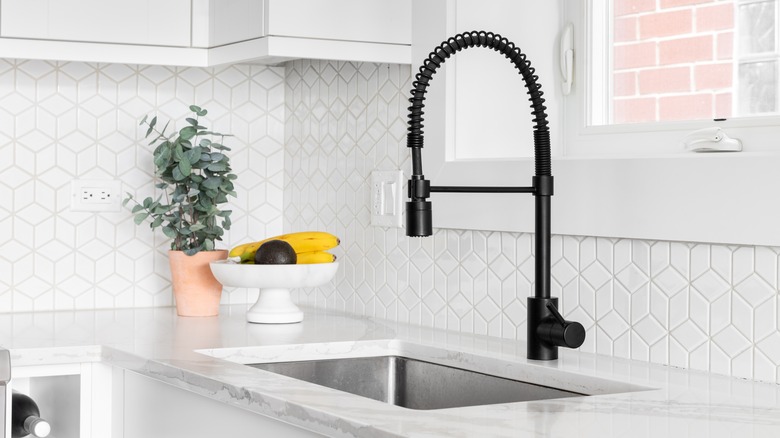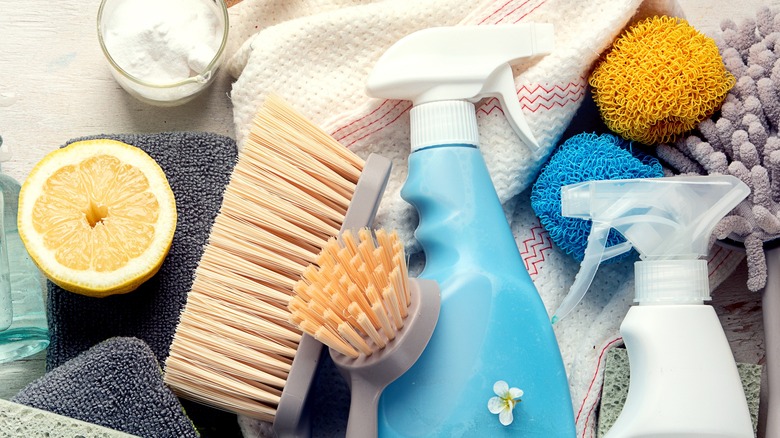Do White Quartz Countertops Yellow Over Time? Here's What We Know
Quartz is one of the most popular kitchen countertop materials. With quartz's wide selection of colors and designs as well as its high durability and cleanability, it is easy to see why. The cost to add quartz countertops to your home is on par with other options like granite. No matter how much you pay, countertops in general are a high-ticket item in your home renovation, so it is essential to protect your investment with proper care. A common concern with quartz countertops, specifically light-colored options like white, is that they will yellow over time. You may wonder if this is even a possibility. The short answer is yes — while quartz is one of the most resistant countertop options to fading and discoloration, it can still yellow. However, this is unlikely to happen just because of aging and usually occurs when it's not maintained properly.
Quartz countertops are made by compacting crushed natural quartz together with resins and pigments to make slabs, which are then sealed. This process ensures that you have a quartz countertop that is durable, low maintenance, and non-porous to prevent absorption of bacteria, mold, and liquids on the surface. Higher-quality quartz counters have a higher percentage of quartz and lower percentage of resin, meaning that they are typically less susceptible to discoloration than cheaper types. However, all grades of quartz can encounter these issues with improper care.
What causes white quartz counters to discolor?
The main culprit of fading and discoloration on white quartz countertops is exposure to corrosive or acidic ingredients. This can be in the form of a chemical cleaner with harsh ingredients such as bleach and surfactants or overly acidic cleaners that contain vinegar or lemon juice. Extremely hard water also has minerals that can cause water stains and limescale buildup, which can discolor or make your countertops look hazy. Cutting acidic fruits directly on the countertop will cause the juice to also damage the finish, as can stains from coffee or wine. Salt can be corrosive, so keep this ingredient off of your quartz as well. Another concern when it comes to quartz discoloration is heat damage. While naturally resistant to some heat exposure, if something that is too hot is placed directly on the countertop, it could cause a blemish or discoloration.
A minor consideration for indoor quartz countertops is sunlight exposure, as the UV rays can break down the resin components over time. Generally, because window panes filter out quite a bit of the UV rays that enter the home, the amount of damage the sun can have on indoor quartz countertops is minimal and discoloration is not typical. However, if your countertop has prolonged or extreme daily sun exposure, this could cause yellowing or fading.
Proper maintenance to prevent discoloration
The most important way to prevent the yellowing of your countertops is to be diligent about regular cleaning with an appropriate cleaner. The best way to clean a quartz countertop is with mild soap, warm water, and a soft cloth. However, you can also disinfect the countertops without harming the seal with a mixture of equal parts rubbing alcohol and water. There are also many quartz-friendly, ph-balanced cleaners on the market — just be sure to avoid abrasive steel wool or scrubbers when applying these products. In addition to routine cleaning, be sure to mop up food and drink spills immediately to avoid prolonged contact with the quartz.
Additional measures should be taken to protect the countertop surface to avoid food and heat contact. Use a cutting board rather than cutting food directly on the quartz, which in addition to protecting the surface also increases the longevity of your knife blades. Always use a trivet under hot pots and pans to avoid sustaining direct heat damage and therefore discoloration.
Finally, there are a couple more extreme precautions you can take if you are worried about yellowing. While a quartz countertop generally does not need to be re-sealed, consult with a professional to determine additional sealer options that can provide an extra layer of protection. Additionally, for areas with high levels of sun exposure or for exterior use, consider using an outdoor quartz specifically engineered with additional UV protection to further prevent fading, discoloration, and yellowing.


